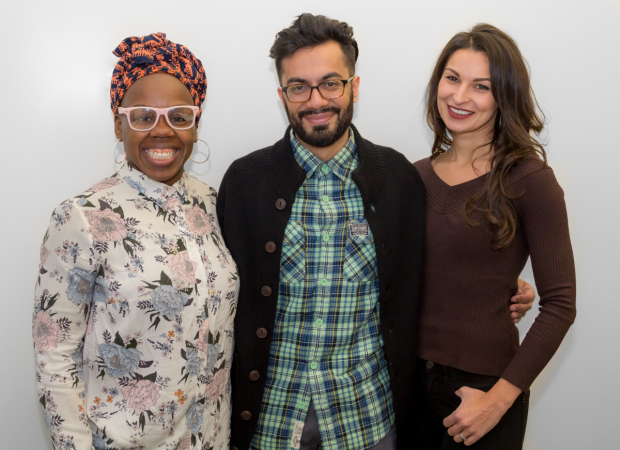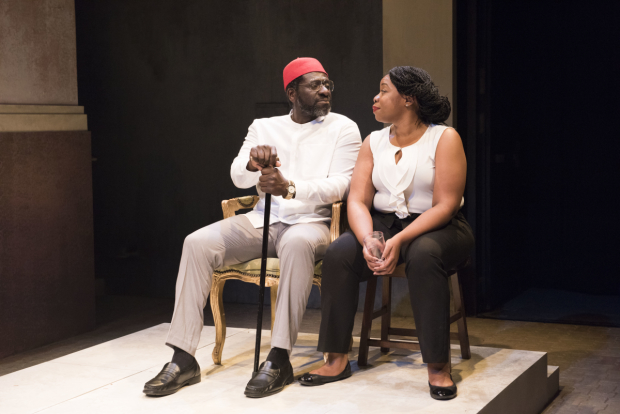3 Bicultural Playwrights Ask: What Is the Process of Becoming American?
A New York writer grips her finely honed American identity as she begrudgingly returns to her native Nigeria to care for her ailing father. A Pakistani Muslim family in London weighs faith against the need to assimilate to their British environment. A Polish woman houses immigrants in a basement apartment in Queens, gradually learning that pursuing an American life may be forgetting all the things and people she used to (and may still) call home.
Ngozi Anyanwu's The Homecoming Queen (Atlantic Theater), Hammaad Chaudry's An Ordinary Muslim (New York Theatre Workshop), and Martyna Majok's queens (LCT3's Claire Tow Theater) — all making their world premieres in New York City this winter — depict three specific immigrant experiences and the emotional nuances that come with each. Catchall phrases like "assimilation" or the "American dream" often reduce immigrant stories to a singular experience: faceless foreigners arriving in a land of opportunity and working hard to earn their way into a new national identity. We forget that this expectation to become something new is accompanied by the expectation that they rip away pieces of their former selves. If you eventually find yourself neither here nor there, where exactly can you call home?
"I don't know what 'home' is," said Majok, born in Poland but raised primarily in Kearny, New Jersey. "This is the question we have, right?" It's a question she threw out to her fellow playwrights Anyanwu and Chaudry as they sat down together to share the unique literary lenses that were shaped by both the blessings and burdens of being bicultural.

(© Seth Walters)
This interview has been condensed and edited for clarity.
Ngozi, Hammaad, and Martyna — to kick off our conversation, can you all give an overview of your plays and how they parallel your personal backgrounds?
Ngozi Anyanwu: The Homecoming Queen is about a writer who has made her living in America. She goes back to where she was born and raised in Nigeria and she's met with all the things she's left behind. The inspiration was my dad, who had gone back to Nigeria to bury his father. He came back kind of emotional, and he and my mom started to talk to us very openly about what they wanted when they passed. It was like, "You know you're gonna have to go back to Nigeria and bury us, right?" I'm one of five, and we were all born and raised in America, so we were like, "I'm sorry what? You're being buried in Jersey." I wanted to write this story about what it is to have that burden in our culture, and the burden of what it is to be bicultural.
Hammaad Chaudry: An Ordinary Muslim is set in London, and it's about British Pakistani Muslims, which is my background as well. It looks at the dynamics of an individual dealing with his family and his community and wider dominant culture. I think I'm trying to reconcile emotions about where we come from, where we are, and how that tension determines where we go next. Pakistan is only a 50-to-60-year-old country. They used to be a part of India that was part of an empire. So how would these characters look and be like if there was no colonial period? And how do you now assimilate? Do you over-assimilate in order to assimilate, or do you insulate yourself and just get by as it is?
Martyna Majok: My play queens is a mix of immigrants. The main character is a Polish woman living with people from different countries, which is similar to the way that I grew up. I was born in Poland, but I grew up here in a multicultural immigrant neighborhood. I started writing the play because a very close family member in Poland had passed away and I couldn't afford to go to the funeral. After that, when I won a fellowship, the first thing I did was buy a ticket to Poland. When I got there my heart broke. Too much time had passed and I realized that frayed the connections back home. That experience reminded me a lot of the people that I grew up with — the choices that they had to make. For them, assimilation isn't the question, it's whether to stay or to go back. Some of my characters think it's going to be temporary and then day by day time gets away from them and they've made another life here.
More often than not, immigrant stories are framed as a quest for a "better life." Does that narrative ring true or false in your experiences?
Martyna: "Better life" yes, but it doesn't mean an "American life." For the people in my play, the choice to have a "better life" means being apart from your family. Some Americans have this general idea of "coming for a better life" as if every immigrant story is the same. That term kind of grates at me because I think people think a "better life" means an American life, and I don't believe that's necessarily true for everybody.
Hammaad: The United States is certainly heralded more as a land of opportunity where the American dream can come true. In the context of the family that I explore in this play, World War II had really taken its toll, and after the fall of the British Empire, members of the former colonies were strongly encouraged to come to the UK, the "land of riches." I think you're left in kind of perpetual doubt if the right decision was ever made.
Ngozi: In my play, Kelechi leaves Nigeria because she equates home with a trauma. The point is just to leave. If you are financially able to do so, then you go to America. And she finds that she's not really happy there either.

(© Ahron R. Foster)
Hammaad: There's this issue when we talk about assimilation — Western countries in particular. We're constantly talking about us assimilating to America or Britain, but there's never a conversation about how America can assimilate toward us. The idea that American society sets some sort of benchmark I think is a problem. If you look at where we are today in 2018, you're looking at a country in trouble. The kind of cultures and value systems that we embody have a positive role to play. Our very presence is an important thing.
Is it difficult to maintain your own cultural values when there's constant pressure to be more American?
Martyna: I started writing the play before Trump was in office — not that that has shifted anything significantly in the narrative — but his election has brought other people's opinions about this country to sharp light. People that I grew up with, some of whom were undocumented and are now citizens, started saying, "No refugees! No more immigrants!" I was shocked by that, and inspired to address that mentality in the play.
Ngozi: There's an attraction to individualism. You make something of yourself. You pull yourself up by your bootstraps — as if you got here by yourself. Someone sent you here, someone gave you that visa, someone got you that job, someone is rooting for you. There is a culture and a tribe that you come from that America intentionally or unintentionally asks you to sever yourself from.
Martyna: That's what I'm trying to figure out. What is the process of becoming American? Is it literally forgetting where you come from? So often that means letting go of people — actual people that were at one point meaningful to you and ideas that were meaningful to you in order for you to move forward in a way that is individualistic and selfish sometimes.
The Homecoming Queen, queens, and An Ordinary Muslim all ask "what if?" Do any of you ever wonder that for yourselves? What if you or your families hadn't immigrated?
Ngozi: I don't think I ever wonder what it would be like. My parents used to threaten us with that when we would get in trouble, so unfortunately I equate it to punishment. [laughs] My family's sort of all over Nigeria, so if it's that deep to me I'll just go back and hang out.
Hammaad: I once proposed that notion to my mother. She told me I was an idiot. We live in Scotland, so we have free healthcare, education, opportunity. It wasn't even a discussion. So yes, I wonder in hindsight, but I don't want to insult my parents' very real struggle by my abstract thinking.
Martyna: I often wonder about the Martyna who never left, who lives in Poland, called by the proper Polish pronunciation of her name. My name was Americanized in school to ''Mar-tee-na," but I'm actually "Mar-ty-na." Who is that person? Would I be a playwright? I have no idea.











